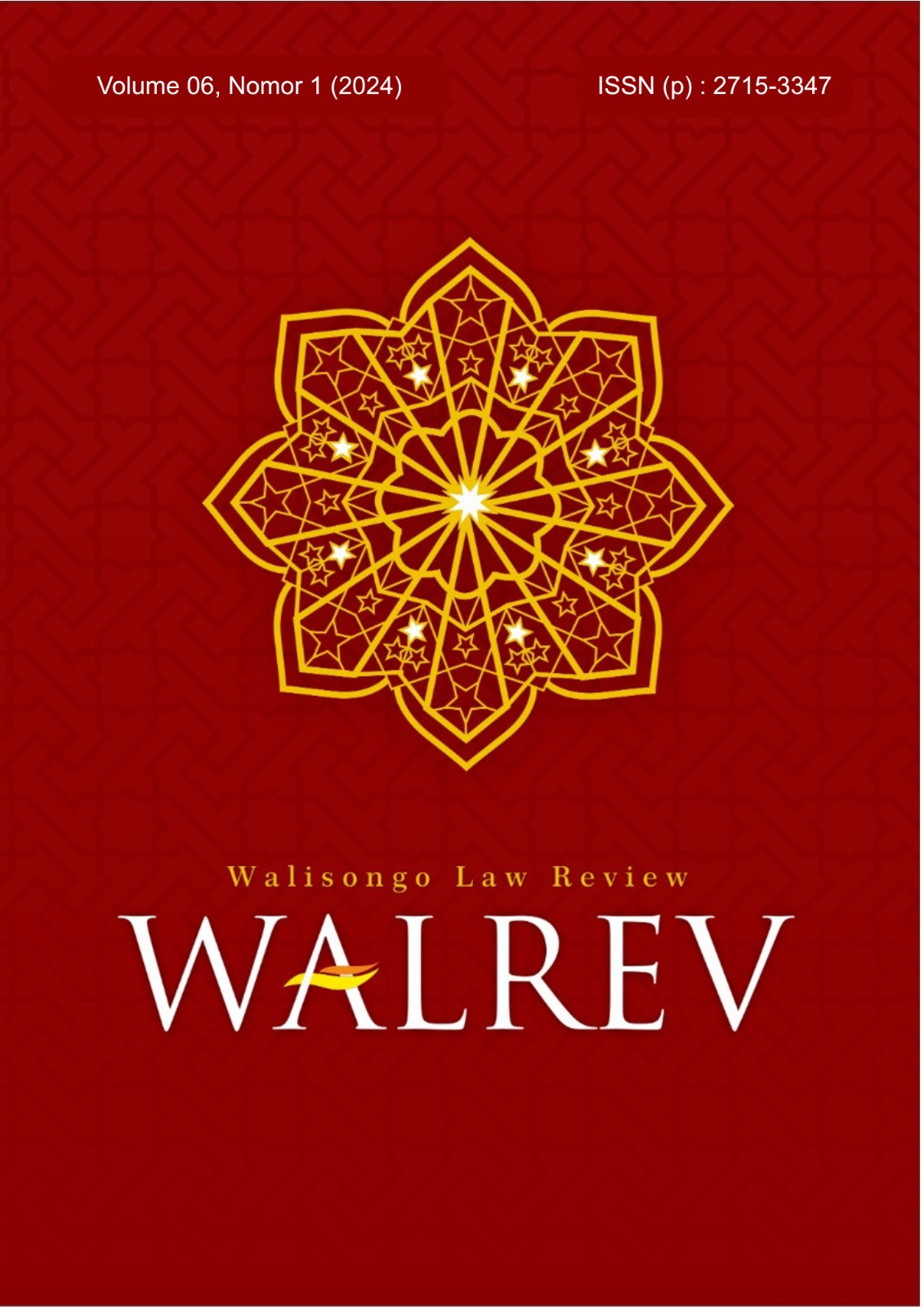Blasphemy as a Criminal Offence: Legal Transformation in Indonesia from Colonial Era to Modern
DOI:
https://doi.org/10.21580/walrev.2024.6.1.22667Keywords:
blasphemy crime, religious offense, transformationAbstract
This research is motivated by the persistence of religious offenses, which serve as the state’s primary legal instrument for prosecuting acts of blasphemy. This situation raises fundamental conceptual issues regarding the definition and application of blasphemy as a criminal offense. The study aims to examine the historical development and transformation of blasphemy offenses within Indonesia’s legislative framework, from the colonial period to the modern era. The enforcement of blasphemy laws in practice has drawn substantial criticism, particularly concerning potential violations of human rights and freedom of religion. The findings indicate that religious offenses are regulated under the Supreme Court Circular Letter of 1964 and Law No. 1 of 1965 on the Prevention of Religious Deviations and the Maintenance of Religious Harmony. Blasphemy crimes are further codified in the Indonesian Criminal Code and Law No. 11 of 2008 on Electronic Information and Transactions. The concept of blasphemy in the Criminal Code establishes it as a core element of criminal liability, wherein religion is not merely incidental but a constitutive element of the offense itself. The protection of religious freedom is influenced by the plurality of definitions of religion, interpretations of human rights, and the evolving understanding of legal safeguards for fundamental freedoms.
Penelitian ini dilatarbelakangi oleh keberlanjutan pengaturan tindak pidana agama yang berfungsi sebagai instrumen hukum utama negara dalam menuntut pelaku penodaan agama. Kondisi ini menimbulkan persoalan konseptual mendasar mengenai definisi dan penerapan penodaan agama sebagai tindak pidana. Studi ini bertujuan untuk menelusuri perkembangan historis dan transformasi pengaturan tindak pidana penodaan agama dalam kerangka legislasi Indonesia, mulai dari masa kolonial hingga era modern. Penerapan hukum penodaan agama dalam praktiknya banyak menuai kritik, terutama terkait potensi pelanggaran hak asasi manusia dan kebebasan beragama. Hasil penelitian menunjukkan bahwa tindak pidana agama diatur dalam Surat Edaran Mahkamah Agung Tahun 1964 dan Undang-Undang Nomor 1 Tahun 1965 tentang Pencegahan Penyalahgunaan dan/atau Penodaan Agama serta Pemeliharaan Kerukunan Hidup Antar Uat Beragama. Selain itu, tindak pidana penodaan agama juga dikodifikasikan dalam Kitab Undang-Undang Hukum Pidana (KUHP) dan Undang-Undang No. 11 Tahun 2008 tentang Informasi dan Transaksi Elektronik. Konsep penodaan agama dalam KUHP menempatkan agama bukan sekadar unsur tambahan, tetapi sebagai elemen konstitusi dari tindak pidana itu sendiri. Perlindungan terhadap kebebasan beragama dipengaruhi oleh keragaman definisi agama, interpretasi hak asasi manusia, serta pemahaman yang terus berkembang terhadap jaminan hukum bagi kebebasan fundamental.
Keywords: Blasphemy; Criminal Offense; Religious Crime; Legal Transformation
Downloads
References
Akbar, Irwan Ahmad. 2019. “Dinamika Kasus Penistaan Agama Di Indonesia.” QOF 3(1). doi: 10.30762/qof.v3i1.1068.
Andi Hamzah. 1994. Asas-Asas Hukum PIdana. Jakarta: Rineka Cipta.
Arief, Barda Nawawi. 2011. Delik Agama Dan Penghinaan Tuhan (Blasphemy) Di Indonesia Dan Perbandingan Berbagai Negara. Semarang: Balai Penerbit Universitas Diponegoro.
Bagir, Zainal Abidin. 2018. “The Politics and Law of Religious Governance.” in Routledge Handbook of Contemporary Indonesia.
Chalik, Abdul. 2017. Filsafat Ilmu: Pendekatan Kajian Keislaman. Yogyakarta: Arti Bumi Intaran.
Crouch, Melissa. 2021. “The Challenges for Court Reform after Authoritarian Rule: The Role of Specialized Courts in Indonesia.” Constitutional Review 7(1). doi: 10.31078/consrev711.
Crouch, Melissa A. 2012. “Law and Religion in Indonesia: The Constitutional Court and the Blasphemy Law.” Asian Journal of Comparative Law 7(1). doi: 10.1515/1932-0205.1391.
Faiz, Pan Muhammad. 2014. “The Blasphemy Law and the Constitutional Court in Constitutional.” Magazine 87.
Hiariej, Eddy O. S. 2014. Prinsip-Prinsip Hukum Pidana. Yogyakarta: Cahaya Atma Pustaka.
Hidayat, Arief. 2018. “Indonesia Negara Berketuhanan.” Mahkamah Konstitusi Republik Indonesia.
Moeljatno. 1987. Hukum Pidana. Jakarta: Bina Aksara.
Mudzakkir. 2011. Tindak Pidana Terhadap Agama Dalam KUHP Dan UU 1/PNPS/1965 Tentang Pencegahan Penyalahgunaan Dan/Atau Penodaan Agama (Kajian Terhadap Praktek Penegakan Hukum Dan Prospek Pengaturannya Dalam Hukum Positif Indonesia. Jakarta: Badan Pembinaan Hukum Nasional.
Van Noorloos, Marloes. 2014. “Criminalising Defamation of Religion and Belief.” European Journal of Crime, Criminal Law and Criminal Justice 22(4). doi: 10.1163/15718174-22042054.
Nurdin, Nazar. 2016. “Delik Penodaan Agama Islam Di Indonesia (Kajian Atas Putusan Pengadilan Negeri Nomor 80/Pid.B/2015/PN.Bna, Nomor 10/Pid.Sus/2013/PN.Pt Dan Nomor 06/Pid.B/2011/PN.TMG.” Thesis, Universitas Islam Negeri Walisongo, Semarang.
Nurdin, Nazar. 2017. “Delik Penodaan Agama Islam Di Indonesia.” International Journal Ihya’’Ulum al-Din 19(1):129–60. doi: 10.21580/ihya.18.1.1745.
Paraswaty, Atika Yuanita. 2016. Tindak Pidana Terhadap Agama Dan Kehidupan Beragama Dalam RKUHP. Jakarta: Lembaga Bantuan Hukum Jakarta.
Ritonga, Binsar Zaroha. 2021. “Tindak Pidana Penodaan Agama Di Indonesia (Kajian Kasus Syiah Sampang Dan Gafatar Aceh).” INTERDISCIPLINARY JOURNAL ON LAW, SOCIAL SCIENCES AND HUMANITIES 2(1). doi: 10.19184/ijl.v2i1.24420.
Rokhmad, Abu. 2019. “The Sunni-Shia Conflict in Madura Indonesia: Judging Individual Faith as Blasphemy.” Pertanika Journal of Social Sciences and Humanities 27(3).
Rokhmad, Abu. 2021. “Institutions and Contributions to Islamic Law in Indonesia’s Legal System.” Walisongo Law Review (Walrev) 3(1):21–44.
Royani, Yayan Muhammad. 2021. “Criminal Policy to Treat Delices Against Religion and Beliefs Harmony.” Walisongo Law Review (Walrev) 3(2):135–62. doi: 10.21580/walrev.2021.3.2.8369.
Rumadi. 2007. Delik Penodaan Agama Dan Kehidupan Beragama Di Indonesia Dalam KUHP. Jakarta: The Wahid Institute-TIFA.
Rumadi. 2020. “Islam and Minority in Indonesia: Muslim‘s Intolerant to the Heterodox Sects.” International Journal of Psychosocial Rehabilitation 24(4):2072–97. doi: 10.37200/ijpr/v24i4/pr2020756.
Rumadi, Rumadi. 2012. “Antara Kebebasan Dan Penodaan Agama: Menimbang Proyek ‘Jalan Tengah’ Mahkamah Konstitusi RI Tentang UU Penodaan Agama.” JURNAL INDO-ISLAMIKA 2(2). doi: 10.15408/idi.v2i2.1177.
Rumadi, Rumadi. 2017. “Hate Speech: Concept and Problem.” Islamic Studies Journal for Social Transformation (2):130–39. doi: 10.28918/isjoust.v1i2.1156.
Senoadji, Omar. 1976. Hukum Acara Pidana Dalam Prospeksi. Jakarta: Erla.
Tendi, Tendi. 2016. “Islam Dan Agama Lokal Dalam Arus Perubahan Sosial.” Al-Tahrir: Jurnal Pemikiran Islam 16(1). doi: 10.21154/al-tahrir.v16i1.365.
Utama, I. Gusti Bagus Rai. 2013. Filsafat Ilmu Dan Logika. Bali: Universitas Dhyana Pura.
Yesmil, Yesmil, and Adang Anwar. 2008. Pengantar Sosiologi Hukum. Jakarta: Grasindo.
The Criminal Code of 1946
The Decree of the President of the Republic of Indonesia (PNPS) Number 1 of 1965
Law of the Republic of Indonesia Number 19 of 2016 concerning amendments to Law of the Republic of Indonesia Number 11 of 2008 concerning Information and Electronic Transaction
The Draft Criminal Code of 2019
Downloads
Published
How to Cite
Issue
Section
License
Copyright (c) 2024 Abu Rokhmad, Saifudin Saifudin, Sunandar Sunandar, Nazar Nurdin

This work is licensed under a Creative Commons Attribution-ShareAlike 4.0 International License.










